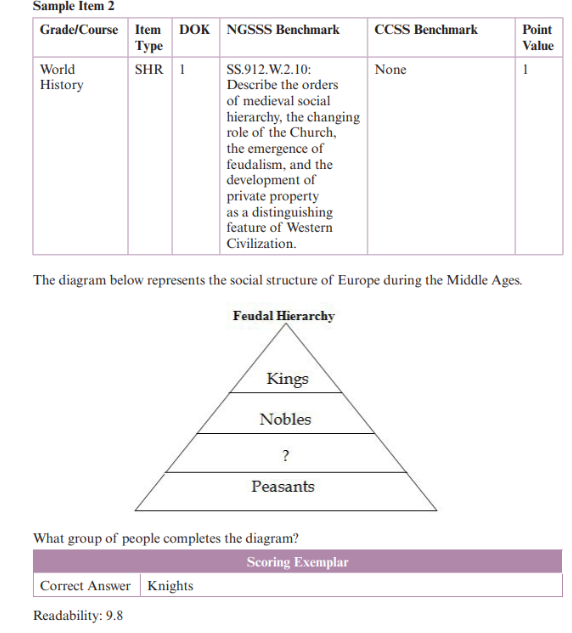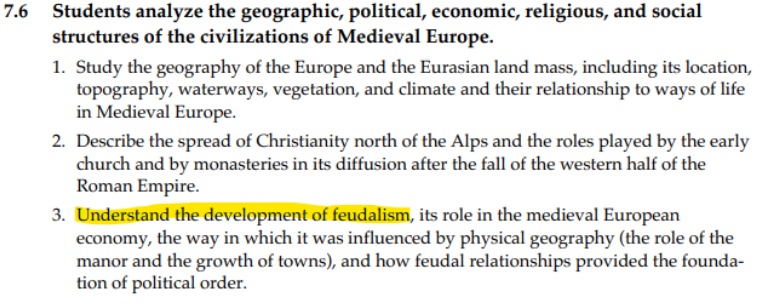Revisiting the Medieval "F-Word" (Feudalism)
How Every State Teaches (or doesn't) about Feudalism

Modern Medieval
by David M. Perry and Matthew Gabriele
Across American secondary education (middle and high school), students aren’t really learning that much about the European Middle Ages.
In some ways, that’s not a surprise; it’s a big world and there’s a lot to teach, plus standards (what gets taught) are set by lawmakers or state officials with diverse agendas and medieval history ain’t their priority. The more troublesome thing is that the little bit of medieval European history being taught is basically false — maybe even actively harmful.

Regular readers will know that we’ve been writing against the idea of feudalism for a few years now, and that the quintessential article debunking the idea that feudalism is false, even if still useful as a construct, was published in 1974. So, this isn’t a new issue.
But despite in general scholars turning away from using feudalism, or at least sincere and deep divides over its utility, it remains broadly taught in schools around the country.
A year ago, David took part in a symposium at Columbia University to honor the 50th anniversary of Elizabeth Brown’s “Tyranny of a Construct” article arguing against the use of the construct of feudalism (the 1974 article we just mentioned). For the symposium, David looked up the history standards for every state in the U.S. plus the District of Columbia, tracking specifically how “feudalism” or “feudal” appears in those standards.
If anyone has done this before, we’re not aware of it. And David learned some interesting things! But before we get to that, just to be clear on our sources and methodology, let’s share some resources:
This slideshow lists basic findings for each state, in alphabetical order.
This spreadsheet tracks whether feudalism is included in course/ grade content, whether it’s mandatory content, and some notes on what medieval content is being taught generally.
In general, we note that every state has standards for what is taught in social studies (as with other fields) at all levels. Some states are highly proscriptive down to the topics or readings, while others engage more with broad questions and skills. Some of the less proscriptive states leave the details to the school districts, which in turn sometimes leave it up to individual teachers.
Here are the top line results.
24 states require teaching feudalism, specifically
8 additional states specifically list feudalism as a potential topic but don’t require it to be taught
19 states don’t mention feudalism at all in their standards (and some don’t mention medieval Europe, even a little bit, at all).
So, of those 32 states that do mention feudalism, here are some examples of mandatory content:
Georgia is fairly typical in asking students to consider about “feudalism and manorialism.” This is interesting because Brown made in her 1974 article is that some of the defenders of the construct use it as a way to talk economics but not politics, and that’s what seems to be happening here.
Arizona and many others use feudal as a connection point for comparing Europe and Japan. Scholars of Japan (note: not our field!) note that the use of the term in their own field is equally problematic, implanted by Japanese scholars who wanted to create a narrative for their country that matched western nations as part of the 19th-century Japanese nationalist project.1
Maryland is an example of a narrow framework, asking about changes to feudalism but only as one of the impacts of The Black Death specifically.
In California, the goal is also specific, asking students to link feudalism to physical geography and place it as the “foundation of political order.” Below, we’ll see some examples of this kind of standard, in terms of specificity, can be used for overt political purposes.

For New Hampshire, feudalism is required to be taught in the context of the role of governments in the economy, along with the stock market and alternative energy sources. This is… odd.2
South Dakota deploys the study of feudalism to talk about pre-modern slavery. It seems that the politics of this is to de-emphasize the uniqueness of North American slavery as it developed.
Florida links the development of private property and feudalism, as part of a broader curriculum tracking the development of “cultural unity” as part of Western Civilization. This is, it seems, about the supposed “triumph of the West” - another explicitly modern political project.
The list could go on, but it’s really our hope here just to collect this group of standards in one place and consider, as a field, how we might (to the extent we agree) model a better set of standards that more represent the best understandings as the field as it is today.
Let us know your thoughts in the comments. And if you notice errors in any state, or changes that have taken place (new legislation), please let us know that as well.
-
I've seen something like New Hampshire's weird combo in other places. For example, the 1995 Virginia state standards had the following:
"4.6 The student will trace the history of Virginia in the 20th century, with emphasis on
"[first bullet] the accomplishments of prominent Virginians, including Woodrow Wilson, Harry F. Byrd, Sr., L. Douglas Wilder, and Arthur Ashe;..."
I don't know what the staff and board were thinking: it's okay if you require the valorization of two of the most vicious 20th c racist politicians associated with Virginia if you balance that with two prominent Black Virginians??
Don't know what led to the NH phrasing but just here to note, it's not alone in weirdness, and I can't imagine the background being worse than what led to that 1995 Virginia item.
-
I think NH’s discussion of feudalism in the context of modern political economy is specifically to read in Hayek’s thesis on the parallels between 20C regulation and redistribution and medieval “serfdom.”
Add a comment: